RWTec-DeTox: Development of a Modular Plant Concept for the Decontamination of Art and Cultural Assets
The treatment of art and cultural property in the past with wood preservatives (HSM) containing biocides such as DDT, lindane and pentachlorophenol (PCP) is now causing major problems for owners, monument conservators and restorers in dealing with these contaminated objects. The technologies used in practice to date for decontaminating these biocides or HSMs are far from mature, especially with regard to the degree of minimisation that can be achieved.
Therefore, new methods for the detoxification of biocide-contaminated works of art are to be researched and developed in a research project initiated by the Leipzig University of Applied Sciences (HTWK) in conjunction with the Helmholtz Centre for Environmental Research (UFZ) Leipzig (Head: Dr. habil. Ulf Roland), which is funded by the Federal Ministry of Economics and Climate Protection (BMWK) under the name RWTec-Detox.
The project is divided into six sub-projects, which are being worked on in cooperation with partners from the university sector, research institutes and industry. One of these sub-projects aims to develop extraction processes to reduce the biocide load on cultural artefacts made of wood and is being worked on independently by the Conservation and Restoration - Wood course at the Potsdam University of Applied Sciences. The focus is on the development of simple procedures for both deep and surface decontamination. The Bavarian State Office for the Preservation of Monuments (BLfD) in Munich, Department AV, could be won for cooperation in the investigations on surface decontamination, because they already have extensive relevant experience.
The individual test series concentrate on the determination of suitable solvents which, on the one hand, have a high dissolving capacity for the biocides mentioned and, on the other hand, leave the originality of the objects largely unaffected. Other important aspects for the selection of solvents are their industrial availability and their at least partially possible production from renewable raw materials. Based on the current status, it appears that certain fuel additives largely fulfil the above-mentioned requirements and offer starting points for the development of a practically relevant detoxification technology.
Project management


Other participants
Staff
Employees
- Sabrina Zoppke
